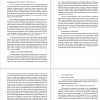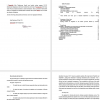Тема: RECOMPOSITION OF THE VALUE CHAIN OF RUSSIAN COMMERCIAL AIRLINES IN CURRENT ENVIRONMENT
Закажите новую по вашим требованиям
Представленный материал является образцом учебного исследования, примером структуры и содержания учебного исследования по заявленной теме. Размещён исключительно в информационных и ознакомительных целях.
Workspay.ru оказывает информационные услуги по сбору, обработке и структурированию материалов в соответствии с требованиями заказчика.
Размещение материала не означает публикацию произведения впервые и не предполагает передачу исключительных авторских прав третьим лицам.
Материал не предназначен для дословной сдачи в образовательные организации и требует самостоятельной переработки с соблюдением законодательства Российской Федерации об авторском праве и принципов академической добросовестности.
Авторские права на исходные материалы принадлежат их законным правообладателям. В случае возникновения вопросов, связанных с размещённым материалом, просим направить обращение через форму обратной связи.
📋 Содержание
CHAPTER 1. LITERATURE REVIEW 10
Value chain definition 10
Value chain of airline 11
Value Chain and Business Model relation 12
Being global as necessary measure for airlines 13
Value network and value grid as extended framework in aerospace industry 13
Disruptions of Value Chain 18
The concept of sanctions 20
Existing research on adaptation of the airlines processes affected by sanctions 20
Research gap 21
CHAPTER 2. THE IMPACT OF SANCTIONS ON AIRLINES VALUE CHAIN 22
Analysis of Russian commercial airline market 22
Value chain in the Russian airline industry 24
Analysis influence of sanctions on industry 31
CHAPTER 3. VALUE CHAIN RECOMPOSITION 35
Ownership options for existing aircraft 35
Maintenance facilities 42
Maintenance spare parts and technology procurement 44
Options for recomposition 48
CONCLUSION 50
REFERENCES 53
Appendix 68
📖 Введение
Problem Statement
The airline industry, a key global sector essential for technological, economic, and social progress among nations, is significantly influenced by various economic, political, social, and technological factors in its external environment. Sanctions implemented in February 2022 resulted in disruptions in the supply in the air industry and closures of airspace between countries. Sanctions such as the prohibition on supplying aircraft and its spare parts to Russia have had financial and operational repercussions on aircraft manufacturers and maintenance services. The ability of these airlines to reshape their operational strategies is crucial for their sustainability and expansion in the both domestic and global marketplace. The examination of these adjustments not only offers insights into the strategic measures adopted by these airlines but also adds to a wider comprehension of the dynamics of international aviation under regulatory constraints. In response to the evolving regulatory environment, Russian commercial airlines are compelled to adapt and recalibrate their value chains to sustain operations and maintain competitiveness. Previous models are no longer suitable for the environment due to a complex landscape of sanctions, restrictions, and limited supply volumes, which collectively threaten the business models and operational logistics of these airlines
Research goal and objectives
The goal of this paper is to identify the options for Russian commercial airlines value chains recompositing in response to sanctions and regulatory pressures
The paper’s objectives are:
• To identify the ways in which Russian commercial airlines were having their value chains.
• To identify the impact of sanctions and regulations on the operations of Russian commercial airlines.
• To identify the strategies employed by Russian commercial airlines to mitigate the effects of these challenges
• To identify a pull option of how airlines might adjust to the environment affected by the global regulatory landscape.
Research questions
Object: Russian airline companies
Subject: Value Chain recomposition strategies
1. What are the differences between frameworks that analyse the value of a business within its operations?
2. What are the distinctive features of the value chain in the airline industry?
3. How governments contributed to the changes of Russian airlines business processes?
4. What impact do sanctions and regulations have on the Value Chain of Russian commercial airlines?
5. What options may be incorporated in airlines value chain recomposition
...
✅ Заключение
Sanctions against Russian airlines have significantly disrupted their operations, primarily targeting aircraft ownership, maintenance, and procurement of spare parts. These restrictions have forced airlines to adapt their value chains to maintain operational viability. It is highly important to own aircraft via purchase or leasing agreements and have maintenance in sustaining airline operations. Russian airlines, notably Aeroflot, have responded by nationalising their fleets, transferring aircraft ownership to Russian entities, and establishing local maintenance facilities. To circumvent sanctions, airlines have alternative procurement strategies, such as using non-original spare parts, parallel imports, and developing local manufacturing capabilities. These measures aim to ensure the availability of necessary parts and maintain the operational fleet. The ability of Russian airlines to adapt to the changing environment demonstrates their resilience. Strategic decisions, including fleet nationalisation and increased focus on domestic manufacturing, have enabled continued operations despite significant challenges. As a result it was found that all recomposition activities since 2022 were exploited. Depending on the resources of the company and its strategy, any option might be considered both simultaneously and individually, in order to achieve the objectives of the company.
It was identified that (1) investing in domestic production of aircraft and spare parts can reduce dependence on foreign suppliers and strengthen the aviation sector's resilience against future geopolitical disruptions. (2) Developing comprehensive local maintenance facilities, can ensure ongoing fleet maintenance and compliance with safety standards. Utilisation of partner-country facilities is possible, however, with greater costs and limitations, restricting possible action. (3) Strengthening cooperation with partner countries and exploring new markets can help mitigate the impact of sanctions and diversify revenue streams as well as support the primary activities that could not be conducted due to limitations of certifications, especially in terms of export-import relations, as this mitigates the associated risks for intermediaries.
This research provides valuable insights into the strategic adaptations of Russian commercial airlines in response to sanctions, contributing to the broader understanding of how value chains can be reconfigured in the face of external shocks caused by sanctions and other regulatory restrictions. The findings offer practical recommendations for industry stakeholders, policymakers, and scholars, emphasising the importance of flexibility, strategic planning, and innovation in navigating regulatory challenges. This research provides identified information on available on the market options that could be utilised not only by Russian airlines, but other (not affected by sanctions) airlines in order to improve value chain.





